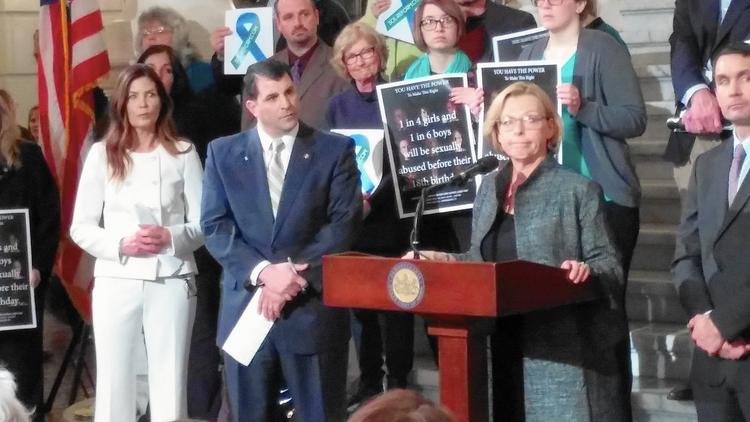Pennsylvania Senate Committee Reveals Its Twisted Priorities
By Bill White
Priorities are important, for people and for politicians. Most members of the state Senate Judiciary Committee made their priorities clear Tuesday. They concluded that it was more important to protect the financial resources of the Catholic Church and insurance industry than to offer justice to more victims of child sex abuse, to unmask predators to protect future children and to punish institutions that have aided and abetted in child abuse. They did this by amending House Bill 1947, the child sex-abuse statute of limitations bill, so that it no longer provides court access to abuse victims who are blocked by present law and haven't reached age 50. Committee members ostensibly did this because they believe it's unconstitutional. In fact, the amendment contains a strange preamble attempting to justify this view. But they had ample expert opinion at their disposal to know this issue was far from decided. What they should have done, if they weren't bowing to the wishes of powerful special interests, was allow the courts to resolve that question. The bill in its new form still would eliminate the statute of limitations for criminal cases of child sexual abuse and extend the statute for civil cases until the victim reaches age 50, from the present age 30. Those who already are blocked by present law would remain out of luck. The committee also eliminated the statute of limitations altogether for future civil suits against individuals, as opposed to institutions. But again, those past 30 now would be barred. While that is an extension of civil court access in the distant future for some victims, it carefully safeguards the Catholic Church and other institutions that may have prolonged or hid the abuse. Priorities. Some readers' reactions suggest they just don't get it. Consider this Facebook question I received this week, edited from the original Facebookese. I know from other correspondence that this person isn't alone: "Bill, you do such great work but on HB 1947, let me ask you, WHEN is it over? How can you attempt to prove this other than hearsay after say, 25-30 years? And why are you coming forth now with alleged offenses? Do you mean these parents that raised you and loved you never knew? Never went to authorities for you? All these years you kept this inside and never revealed this for documentation? Please! After 15 years? You are a grown-up! Put up or shut up! I'm getting sick of these lawsuits! Bill, 60 years ago putting the prayer cards for Mass in the pew that the nun asked me to do. I got a splinter. Still have that mark. Can I sue? Enough is enough!" I suppose the best place to start is with the idea that getting a splinter can be equated with a child's being raped. This is one reason I've encouraged people to read the grand jury reports, most recently from the Altoona-Johnstown Diocese. Vague allusions to being molested are a far cry from the horrible details of these crimes and the extent to which they can destroy lives. You need to understand how often these victims have tried to dull their emotional pain in alcoholism, drug addiction, promiscuity, even suicide. We're not talking about splinters, except maybe those driven into children's souls. Statistics show that on average, it takes victims until around age 40 to sufficiently overcome their anguish to finally speak up about what has happened to them. Even the children who do tell their parents won't necessarily find them receptive, particularly if the abusers are family members, friends or beloved clergymen. What's more, the grand jury reports make it clear that when victims have come forward and sought justice from the church, the crimes sometimes have been covered up and perpetrators moved elsewhere. All those are reasons why we need longer statutes of limitations for victims of these crimes and why victims blocked by previous laws deserve access to justice. The experience in other states has shown that false claims are extremely rare and that opening windows for such lawsuits exposes hidden abusers who couldn't previously be identified because they were immune from prosecution or suit. Shouldn't saving children be more important than the risk of financial exposure for a church or other institution? I think so. I will offer one mildly hopeful note. As disappointing as this committee capitulation is to victims and advocates, for whom the retroactive piece has tremendous emotional resonance, the changes remaining in this bill would make it more difficult for future child sex abusers to get away unscathed. That's a good thing. There's also the possibility, I guess, that the full Senate will restore the retroactive portion of HB 1947 or that the House will fight for it if it's presented with an amended bill for concurrence. Nor do I think this issue will die. Don't be surprised if there are more grand jury reports, with more horrible revelations that put fresh pressure on legislators to reassess their twisted priorities and stop hiding behind constitutional concerns that are best resolved in court, not Capitol back rooms. Maybe they'll do the right thing someday. I just wish they had done it this week. Contact: bill.white@mcall.com 610-820-6105
|
.
Any original material on these pages is copyright © BishopAccountability.org 2004. Reproduce freely with attribution.
